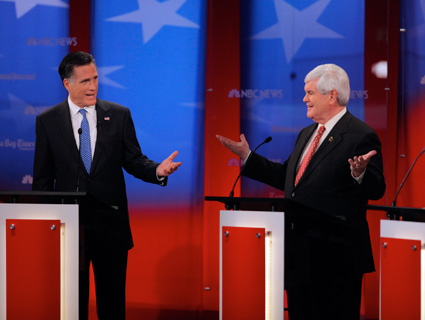In Monday night’s NBC debate, Mitt Romney continued to peddle the myth that he’s a titan of free enterprise—the sort of master of the private sector who has never once benefited from tax breaks or government subsidies.
Yet Romney’s time at Bain Capital was ridden with numerous episodes of Bain-acquired companies leaning heavily on state tax packages, as the Los Angeles Times reported just a few weeks ago:
Bain Capital began looking at investing in the steel start-up [called Steel Dynamics] in late 1993. At the time, Steel Dynamics was weighing where to locate its first plant, based in part on which region offered the best tax incentives. In June 1994, Bain put $18.2 million into Steel Dynamics, making it the largest domestic equity holder. It sold its stake five years later for $104 million, a return of more than $85 million.
As Bain made its investment, the state and county pledged $37 million in subsidies and grants for the $385-million plant project. The county also levied a new income tax to finance infrastructure improvements to benefit the steel mill over the heated objections of some county residents. . . .
Another steel company in which Bain invested, GS Industries, went bankrupt in 2001, causing more than 700 workers to lose their jobs, health insurance and a part of their pensions. Before going under, the company paid large dividends to Bain partners and expanded its Kansas City plant with the help of tax subsidies. It also sought a $50-million federal loan guarantee.
“This is corporate welfare,” said Tad DeHaven, a budget analyst with the Washington-based Cato Institute, which encourages free-market economic policies. DeHaven, who is familiar with corporate tax subsidies in Indiana and other states, called the incentives Steel Dynamics received “an example of the government stepping into the marketplace, picking winners and losers, providing profits to business owners and leaving taxpayers stuck with the bill.”
On the campaign trail, Romney’s made a habit of denouncing “crony capitalism” and government intervention in the private sector. He’s tried to convince Republican voters that he’s never engaged in it, doesn’t like it, and that real American businessmen won’t practice it.
But there’s plenty of evidence in Romney’s record that the fine art of crony capitalism is a crucial piece of making it big in the sort-of free market. In other words: it’s part of doing business in a democracy.













